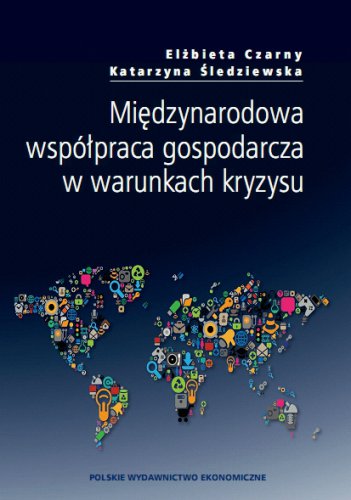Międzynarodowa współpraca gospodarcza w warunkach kryzysu
Publication date: 2013
Place publication: Warszawa
Publication: I
Binding: paperback
Format: 162x237
The book contains an analysis of the influence the recent economic crisis had upon the economic situation and economic cooperation around the world, in various groups of countries and in selected individual countries. The Authors pay particular attention to the global nature of the crisis and emphasize a more serious decline of the value of global trade than that of global production. They examine the changes that occurred during the crisis or before it began, in global production, trade in goods and services, and FDI. The research presented includes disaggregation of the global economy into economies of states at various levels of development and different export specializations, as well as into economies belonging to different integration groups. This way they examine how the crisis impacts any individual group. They also come up with an analysis of the real structure of global trade and its changes during the crisis. Special focus is also dedicated to trade in final and intermediary goods and to products on various levels of technological sophistication, as well as to intra-industry exchange. An empirical analysis is performed of factors that determine the intensity of trade (including the economic crisis and the share in institutionalized economic integration), with gravitation models applied.
The book is addressed to economists and experts in political sciences, experts in international relations, students in faculties of economics and in interdisciplinary studies with emphasis upon international problem areas. The book should also prove interesting and useful to analysts employed in enterprises involved in export, import and financial markets. Conclusions and statistical data presented may also be of interest to politicians and journalists dealing with economic issues.
International competitiveness of national economy ID: 2054250136
The principal general objective of the book is to present the key elements of both theory and policy of international competitiveness under conditions of contemporary global economy, taking into account theoretical output and past experience. Considerations included in the book’s eight chapters aim to achieve this, each of them being focused upon the theory and policy of international competitiveness on macro scale, i.e. with particular account taken of theoretical reasons and effects of individual countries’ (states), as well as groups of countries, competing with each other. This is not meant to say that problems regarding international competition of other types of business entities are overlooked, especially as regards various types of enterprises and their associations. These problems, however, are treated as secondary in this approach – whereas this is an assumption made for the book, it should not be mistaken for ignoring their significance which, as admitted, is serious and increasing.
The book is an extension of an earlier publication by Prof. Józef Misala, entitled International capability of competition and competitiveness of national economy. Theoretical fundaments (2007, Radom University of Technology). Its contents results from further research carried out in the Institute of International Economic Relations at Warsaw School of Economics, as well as, for a couple of recent years, at the Chair of International Economic Relations and Regional Integration at the Radom University of Technology.
Wstęp
1. Handel w warunkach kryzysu gospodarczego
1.1. Geneza kryzysu gospodarczego z końca pierwszej dekady XXI wieku
1.2. Główne przyczyny spadku obrotów handlowych w czasie kryzysu gospodarczego w teorii ekonomii
1.3. Przyczyny wzmocnionego spadku handlu w czasie ostatniego kryzysu gospodarczego — przegląd badań empirycznych
1.4. Uwagi końcowe
2. Gospodarka światowa i handel w warunkach kryzysu gospodarczego
2.1. Światowy PKB i handel
2.2. PKB i handel grup państw różniących się poziomem rozwoju gospodarczego
2.3. PKB i handel państw o różnych specjalizacjach eksportowych
2.4. Handel usługami
2.5. Światowe bezpośrednie inwestycje zagraniczne
2.6. Otwartość gospodarki
2.7. Najwięksi uczestnicy handlu światowego
2.8. Uwagi końcowe
3. Największe ugrupowania integracyjne w gospodarce światowej, handlu międzynarodowym i przepływie kapitału bezpośredniego
3.1. Formy i podstawy prawne regionalnych ugrupowań integracyjnych
3.2. Ugrupowania integracyjne w gospodarce światowej
3.3. Ugrupowania integracyjne w światowej wymianie towarowej
3.4. Ugrupowania integracyjne w światowym handlu usługami
3.5. Udział ugrupowań regionalnych w światowych bezpośrednich inwestycjach zagranicznych
3.6. Unia Europejska, strefa euro i wybrane państwa członkowskie w handlu światowym
3.7. Uwagi końcowe
4. Struktura rzeczowa światowej wymiany towarowej
4.1. Handel dobrami finalnymi i dobrami pośrednimi
4.2. Handel produktami przemysłowymi o różnym zaawansowaniu technologicznym i odmiennej intensywności wykorzystania czynników produkcji
4.3. Uwagi końcowe
5. Czynniki decydujące o intensywności międzynarodowej wymiany towarowej
5.1. Prekursorzy wykorzystywania prawa grawitacji w ekonomii
5.2. Model grawitacji jako narzędzie badania wpływu kryzysu na wielkość handlu
5.3. Empiryczna analiza wpływu ostatniego kryzysu gospodarczego na handel międzynarodowy
5.4. Uwagi końcowe
6. Handel wewnątrzgałęziowy Polski z wybranymi państwami i grupami państw
6.1. Handel międzynarodowy we współczesnej gospodarce światowej
6.2. Główne przyczyny prowadzenia handlu wewnątrzgałęziowego
6.3. Poziomy i pionowy handel wewnątrzgałęziowy
6.4. Znaczenie handlu wewnątrzgałęziowego w gospodarce światowej
6.5. Polski handel wewnątrzgałęziowy
6.6. Uwagi końcowe
Podsumowanie
Bibliografia
| Odbiór osobisty | 0 € |
| Kurier Inpost | 4 € |
| Kurier FedEX | 4 € |
| Inpost Paczkomaty | 4 € |
| Free delivery in Reader's Club | from 47 € |

